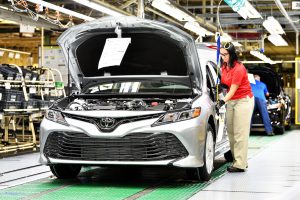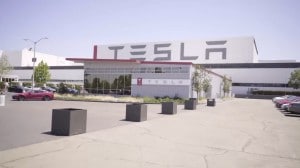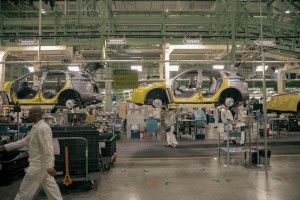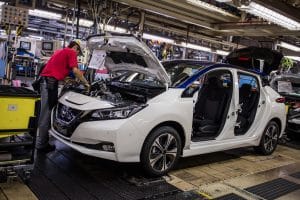
Toyota’s Georgetown, Kentucky plant was scheduled to reopen April 20, but the automaker has pushed that back to May 4.
Toyota has become the latest automaker to extend the shutdown of its North American automotive operations, the industry giant saying its factories won’t start rolling again until May 4.
Virtually the entire industry has shut down across the continent, manufacturers repeatedly pushing back plans to reopen in light of the worsening coronavirus pandemic. Even with plants closed, automakers face massive build-ups of inventory across the U.S., a situation compounded by plunging sales – J.D. Power forecasting U.S. demand this month will be down as much 80% compared to April 2019.
To preserve shrinking resources, automakers are now cutting salaries and, in some cases furloughing employees without pay, exacerbating a crisis that already has seen more than 11 million U.S. jobs eliminated during the past two weeks. Those taking such unusual steps include Tesla, Nissan, Honda and BMW.
(Plummeting auto sales causing inventories, layoffs to rise.)
The industry hopes such moves will be short-lived, especially if they can restart production early next month. But that may prove much more difficult than it might first seem, warned one industry veteran.
The economic impact of the manufacturing shutdown and concurrent plunge in sales cannot be overestimated. According to Doug Betts, president of Power’s Automotive Division, $11 billion in new vehicles roll out of the 53 U.S. assembly plants each week. The industry, in turn, directly or indirectly employs about 10 million Americans.
The cost of being in limbo is severe, particularly for a company like Nissan that was already facing financial struggles before the pandemic struck. The automaker had already laid out plans to cut 12,500 jobs last year. And it now plans to furlough 10,000 hourly employees in Tennessee and Mississippi through late April. They will receive no pay during that period, though they could qualify for state unemployment benefits.
“What’s happening today is challenging, but it’s not impossible,” Chief Operating Officer Ashwani Gupta said during an appearance on Bloomberg TV on Tuesday, adding that, “we are focused on how we can capitalize existing assets.”
Nissan is not alone. Honda has told 14,400 factory employees in the U.S. that they also will be furloughed without pay through at least May 1, when it currently plans to resume production.
Whether Honda and Toyota can stick to that schedule – along with other manufacturers aiming for early May – is far from certain, however. Most automakers originally hoped to start up plants by the end of March, some then shifting to mid-April, and now to May.
To be clear, Toyota is not furloughing direct employees. In a statement from the automaker, it clarified its plans.
“Toyota’s philosophy continues to be long-term, stable employment for team members,” the company said. “We are not furloughing any of our direct employees. We are asking our hourly plant employees to take two days out of the 10-day extension as “PTO” (paid time off), or they can go without pay if they don’t have PTO banked.
“The Variable workforce (VWF), provided by our partner agencies, are also an integral part of our organization, as they help us provide quality products for our customers. We are currently in an unprecedented situation, so we are releasing variable workforce back to their agencies (technically not a “furlough” as they are not Toyota employees).
(Pandemic will have “a permanent effect” on auto industry.)
“We will continue to pay for the benefits of the VWF for the time being, and they may be eligible for unemployment. We are also maintaining our relationship with the VWF workers so as production demand increases, they will have the opportunity to return.”
Workers with Detroit’s Big 3 will continue to receive factory compensation enhancing unemployment while off the job. But those automakers have announced various levels of pay cuts for white-collar and, in particular, senior-level employees.
Among European manufacturers, BMW has now weighed in with plans for unpaid furloughs in the U.S. while cutting 6,000 jobs in Germany.
In California, Tesla was one of the last automakers to shutter operations, CEO Elon Musk initially downplaying the coronavirus pandemic. The company’s Fremont assembly line continued to operate even after a shelter-in-place order was announced for six San Francisco-area counties. Only after sheriff’s deputies showed up with a court order did the factory close.
On Tuesday, Tesla said it was furloughing all non-essential employees while also implementing salary cuts through the end of the second quarter. The battery carmaker, like Toyota, hopes to have operations back up and running on May 4.
One concern is whether manufacturers will be able to meet those production targets, however. During a media conference call on Wednesday, Power’s Betts warned that unless automakers can restart their parts supply chain ahead of time they likely will face trouble.
Most of those 53 U.S. assembly plants now operate on a just-in-time inventory basis, noted Betts, a former long-time Chrysler executive. So, if they try to start up without getting a fresh flow of parts, “They may immediately shut down.”
(Fever pitch: coronavirus taking increasing toll on auto industry.)
It may require an unprecedented cooperative effort among traditional competitors for automakers to ensure that the supply side of the business is back up and running, cautioned Betts, before they can start moving cars, trucks and crossovers down their own assembly lines.



